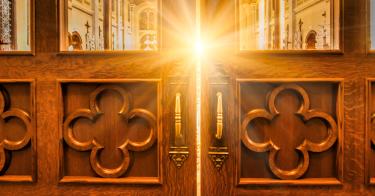COVID-19 is taking a toll on Americans’ minds, hearts, and souls. Houses of worship can play an essential role in treating these problems.
The Census Bureau reports that one-third of Americans now show signs of clinical anxiety or depression. The problem is especially pronounced among women, the poor, and young adults, even though they are less likely to become seriously ill from the virus.
COVID-19 unemployment could make this worse. Calls to suicide hotlines have spiked as the shutdown drags on. One study projects up to 75,000 deaths from drug or alcohol misuse and suicides over the next decade. With 1 in 4 Americans now facing unemployment, there is great concern about rising “deaths of despair.”
Research reveals a strong linkage between faith and mental health. Studying post-traumatic stress disorder among veterans, Harold Koenig of Duke University Medical Center found that spiritual involvement gave veterans emotional stability that increased their resiliency to trauma.
>>> Faith and Civil Society During COVID-19
Professors Byron Johnson and Christos Makridis discovered a causal relationship between religious affiliation and subjective well-being. They attributed it, in part, to the increased social capital that members of a religious community enjoy.
These studies provide a strong public-health rationale for President Trump’s May 22 decision to identify “houses of worship … as essential places that provide essential services.” His announcement was accompanied by guidance on social distancing from the Centers for Disease Control and followed by a warning from the Justice Department that: "Even in times of emergency, when reasonable and temporary restrictions are placed on rights, the First Amendment and federal statutory law prohibit discrimination against religious institutions and religious believers.”
Some governors like California’s Gavin Newsom opened restaurants and bars while keeping houses of worship closed, despite polling that shows most Americans would prefer houses of worship open first. Minnesota Gov. Tim Walz allowed malls and casinos to reopen at 50% capacity, but limited gatherings in houses of worship to 10 people … until Catholic and Lutheran leaders protested.
Will people behave responsibly in a bar or casino, but irresponsibly in a synagogue or mosque? The stricter treatment of houses of worship raises not only the legal matter of unequal treatment, but also questions about public health.
Illinois Gov. J.B. Pritzker decreed that liquor stores and cannabis dispensaries could open, but houses of worship could not. Do alcohol and marijuana provide answers for Americans who are out of work and struggling with social isolation?
Shopping malls and bars may meet physical and social needs, but they are inadequate for our mental, emotional, and spiritual needs. Many Americans find encouragement through their faith. Even government officials who are not religious would be wise to recognize the power of faith to encourage the struggling.
The Founders protected religious freedom not just so that we could worship as individuals, but so that we could practice our faith in community with others. As COVID-19 takes a devastating toll on both bodies and souls, houses of worship should be permitted to play their essential role in hope and healing.
This piece originally appeared in The Philadelphia Inquirer



